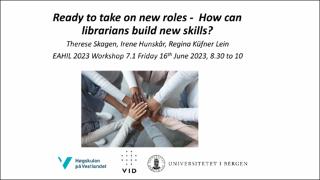| dc.description.abstract | Purpose
The purpose of this workshop is to explore the different opportunities on how librarians can build competencies to cope with new roles and tasks. We will invite participants to group discussions and to share their experiences about how librarians can learn new things and build new skillsets.
Background
During the last ten years, mainly because of technological development and research policy requirements, several new library services have emerged. New tasks within health-related libraries refer to open science, systematic reviews, user experiences, clinical librarianship, and research data. There is a great need for specialization, and therefore, recruitment in the sector can be a challenge (1,2).
Some library organizations offer certifications for librarians and well-established competencies frameworks which are used for self-evaluating, and for developing continuing education courses (3-5). However, in many countries there is no certification, and librarians more or less have to rely on occassional offers for continuing education.
Building competencies requires extra effort, initiative and motivation by the individual librarian. In a Norwegian survey from 2022, medical and health librarians reported that time, the financial situation and the internal organization of the library influenced on their possibility to build competencies through continuing education and courses (6). The results showed further that workplace learning and personal effort were often used to develop skills and knowledge to offer new library services.
Summary
In this workshop we want to elaborate how librarians can build competencies to offer new and relevant services, and adapt to new roles. Librarians know about areas of expertise where we need to build or update competencies (3-5). In this workshop we want to elaborate on how you as an individual librarian can make a difference. Here are some possible questions for the workshop:
- How can individual employees enhance their competencies?
- How can knowledge building activities for employees be organized in libraries?
- How can librarians fit competency building into a busy working schedule?
Activities in the workshop
After a brief introduction, the participants will work in small groups, 4-5 persons in each group. Each group will discuss one of the specific questions mentioned above. No preparation needed by the participant in advance.
The participants will be divided equally to the groups. The workshop will have a limit for 30 persons in total. When maximum number of participants is reached, ideally 2 groups will discuss the same question.
In the groups there will be possibilities for participant to exchange of experiences and discuss new ideas through brainstorming and making suggestions for action. The works shop leaders will act as facilitators and time managers for the groups. The discussions will take approximately 40 min.
We will use a digital board where each group reports their results and suggestions. Such boards make it easy to collaborate, and the contributions from all groups are displayed on one screen. The digital bords will allow the groups to comment and complete other groups’ questions, like in a world cafe. The groups will use about ten minutes to comment one of the other questions.
The remaining time will be used for plenary discussions and summing up.
Participants are encouraged to bring their own device; phone or laptop.
References
1. Haglund L, Roos A, Wallgren-Björk P. Health science libraries in Sweden: new directions, expanding roles. Health Info Libr J. 2018;35(3):251-5. https://doi.org/10.1111/hir.12229
2. Lawton A, Burns J. A review of competencies needed for health librarians-a comparison of Irish and international practice. Health Info Libr J. 2015;32(2):84-94.
3. CILIP - The Library and information association. The professional knowledge and skills base [cited 2021 8 Jan]. Available from: https://www.cilip.org.uk/page/PKSB
4. Medical Library Association. MLA Competencies for Lifelong Learning and Professional Success 2017.
[cited 10 Nov 2022]. Available from: https://www.mlanet.org/page/test-competencies
5. Australian Library and Information Association. ALIA HLA competencies. 2018 [cited 10 Nov 2022]. Available from: https://read.alia.org.au/alia-hla-competencies
6. Skagen T, Hunskår I, Lein R K. Kompetansebehov for morgendagens bibliotekarer. Prosjektsøknad. 2021 [cited 10 Nov 2022]. Available from: https://bibliotekutvikling.no/prosjektbank/prosjekt/kompetansebehov-for-morgendagens-bibliotekarer/ | en_US |
